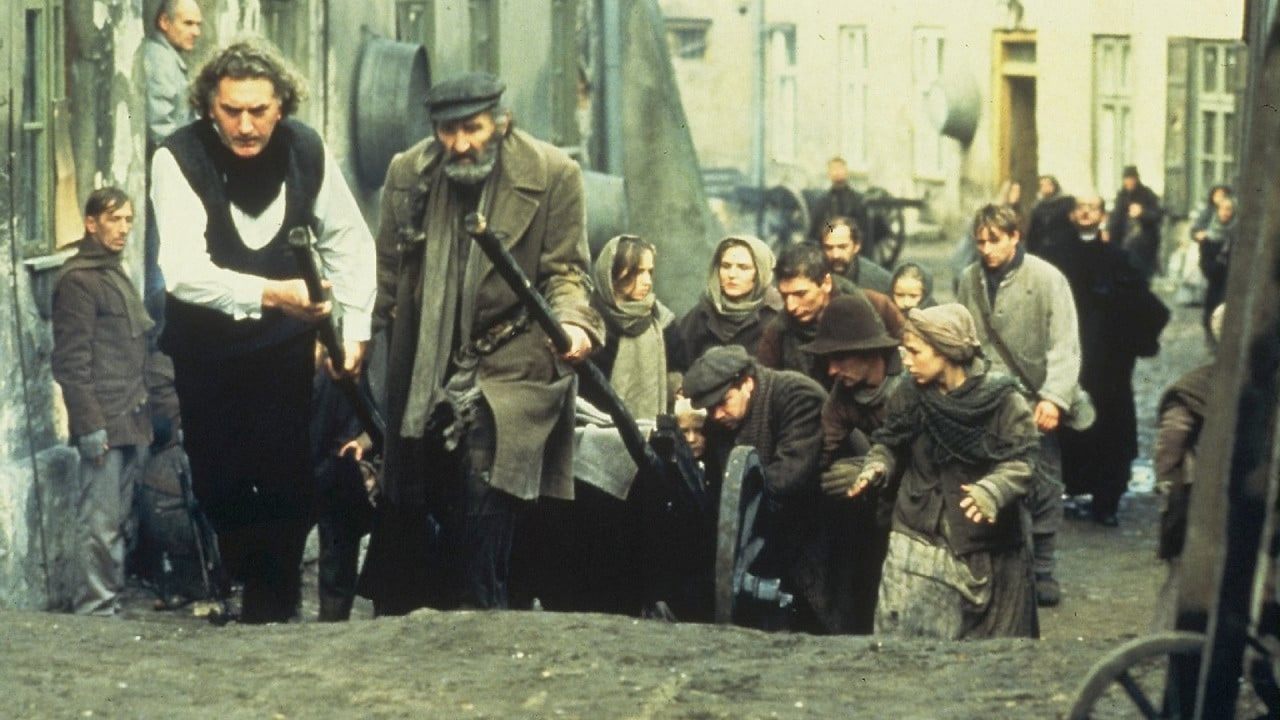Dirk Van Hauwaert
Beautiful depiction of the workers' fate during the first half of the 20th century. Priests and church are supposed to play their role of keeping the workers at peace. When father Daens resists he gains such a response that the powers have to bend. True story! Went up for an Oscar but due to the fact that the French had a lot more money to support their film it fell short. Brilliant role for Jan Decleir, mostly known for his one-man plays, adaptations of Dario Fo. Proof you do not need violence or sex to make a movie exciting. What is needed is a strong story (very much so in this case) and a couple of great actors. If you have the chance to watch it, do so, it will alter your view on the world, there are not enough (nice) movies of this kind around. Again: it all happened as it is depicted here.
captain-howdy
This is considered as undoubtedly the most important Belgian film ever made, a cinematic event in its home country when it came out. People flocked to see it, awards were bestowed on it, students wrote term papers about it, everybody talked about it, every school showed it to its students (and they still do, more than ten years later), and its director, Stijn Coninx, even got made a baron on the strength of it. Even so, Coninx was never really able to live down the reputation of "director of Daens". In a country with basically no film tradition to speak of, a movie like Daens is a once-in-a-lifetime achievement, if only because they'll never allow you to spend that much money again, even if it did earn it back. One cannot help but feel that had he made the equivalent of this one in America, he'd be one the biggest directors around today.The story is about a courageous, socially feeling priest who went against church authorities and the political powers that be (heavily interlinked at the end of the 19th century) to help the impoverished workers of Aalst, Belgium. Although romanticised somewhat, and even with the addition of certain characters to strengthen the dramatic arc of the movie, this is based on a true story. Coninx did absolutely amazing things with a limited budget to bring the era back to life, and his camera lingers tellingly in the dirty, narrow little streets where the workers were packed together, entire families with hordes of children living in one room. We also get to see the factories, dangerous places, where people spend twelve or more hours a day for scraps off the tables of the wealthy factory owners. All of this is brought to life in a completely convincing way, immersing you in the period.Coninx' control as a director here is remarkable. Without any real money (certainly by US standards), he manages to pull off a story of epic scope that looks and feels exactly as it should. Consider a scene set in the palace of the king, where an opulent dinner is going on, served by black people brought over from what was then Belgian Congo. "Are they dangerous?," one of the women asks. Lesser directors might have hammered the point home by going on about it, but Coninx doesn't. He lets this one simple line stand, lets it speak for itself and moves on. This way, he's able to pack in a surprising amount of stuff in the 135 minutes running time, and it doesn't feel rushed or hurried, but on the other hand, very natural. Visually too, this scene is as striking as any, showcasing the luxury of the wealthy as opposed to the squalor of the poor. And again Coninx doesn't make a point of it, he doesn't give in to the temptation of making self-conscious cuts or moving the camera that way. He just lets it be, keeps things simple.Jan Decleir gives a powerful performance as Adolf Daens, who comes off as a brilliant orator, an almost saintly figure who heeds no warnings and goes on in the face of public humiliation, ex-communication and even physical violence. This is probably a simplification of the truth (it's hard to believe anyone is THAT perfect), but the power Decleir brings to the role makes it work.There are some minor problems, however. The screenwriters and directors seem to have a somewhat naive belief in the socialist party of the time, as a well-meaning boys' club that basically says the same things Daens says throughout the movie. And there are some scenes that feel phony, such as an unbelievably corny moment in a field, when one the characters rides along on a bike, yelling extacically that Daens has just been elected to parliament. Cut to a shot of an old man falling to his knees with pure joy, as the triumphant music swells. Sorry, but that's just a bit too much.All in all this is a movie deserving of its status as classic in Belgium, and very much worth seeing where ever you're from. Back here, we've been beaten over the head with this movie so many times that a lot of people must almost know it by heart, but then that's not the movies fault.
Libretio
DAENS Aspect ratio: 1.85:1Sound format: Dolby Stereo SRStijn Coninx's exemplary period drama mixes gritty realism (the harshness of life amongst the poor in 19th century Flanders) with romantic heroism (the struggle of the title character - a priest - to free the oppressed workers from the tyrannical control of their middle-class rulers). Coninx takes a distinctly cinematic view of the proceedings and never allows the film's depressing subject matter to overwhelm the viewer, preferring instead to milk the dramatic potential from a fascinating script, which is based on fact. Every scene is a miniature gem, sometimes small and intimate, sometimes grand and sweeping, and Coninx invites the viewer to share in Daens' sense of outrage and injustice. He's helped in no small measure by a superlative cast, headed by Jan Decleir as the passionate, free-thinking Daens, Antje de Boeck as a gutsy factory worker who rails against the horrendous working conditions around her, and Gerard Desarthe as the villain of the piece, determined to maintain the status quo and discredit Daens in the process. Michael Pas also makes an impression as a dedicated Communist who rallies to the priest's cause and falls in love with de Boeck along the way. Excellent production values. (Dutch and French dialogue)
James B.
Jan Decleir stars as the real-life populist preacher Father Daens, who helped textile workers in Europe struggle for justice in the late 19th century. This is a very moving and powerful film which squarely takes on many problems which our modern industrial societies have inherited from the Industrial Revolution.Especially heartbreaking and infuriating are the scenes which juxtapose young factory children being overworked, abused and mangled by the textile machines with rich and powerful nobles around their sumptuous dinner tables. The emotional high point of the film, for me, came when Daens gives an impromptu speech in a church, shouting out, "People scream, 'we are hungry!' Loud and clear!" It is difficult not to be emotionally caught by such a scene.Father Daens ultimately shows in this film what Gandhi told someone: that one's religion is in one's actions, not in one's words, clothes or wealth.


 AD
AD
